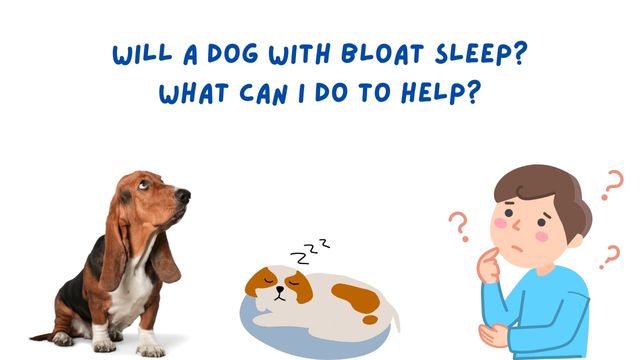Do you suspect or know that your dog has bloat? Have you noticed that your pooch has been having troubled nights and keeping you up with his rolling, pacing, and whimpers? Bloat is never a fun experience for our canine companion, and it stresses us out as pet parents. I can understand how overwhelming it could be trying to sleep next to a pet who is in pain and cannot sleep.
Bloat or gastric torsion is a life-threatening condition where the stomach builds up with gases, food, or fluid, which in turn causes the stomach to distend. In more severe cases, the stomach distends and then twists, cutting off blood and oxygen supply to the stomach and also to the other abdominal tissues. This is called gastric dilatation and volvulus (GDV). Bloat is the second biggest killer of dogs after cancer.
Bloat affects all activities, even the simple ones, in your dog’s life, including eating, drinking, pooping, farting, urinating, and others. Yet, with the right knowledge and by taking the right steps, you can make this experience less stressful for your pet and even help him get a little bit of sleep before getting the necessary medical intervention. So, if you want to know if your bloated dog will sleep tonight and how to help him through this tortuous ride, keep reading!

Can a Dog with Bloat Sleep?
It is improbable that a bloated dog will be able to get beauty sleep during the night. Bloat in dogs causes agonizing pain that prevents them from sleeping, eating, playing, and even passing gas. Such a dog will be uncomfortable because of the increased abdominal pressure and will not be able to find a suitable sitting or lying position leading to a fitful sleep. The swollen stomach may also injure the abdominal wall and other organs leading to severe inflammation and increased pain.
In less severe or earlier cases of bloating, your dog may not have an entire night of troubled sleep. He will be able to get a few hours of sleep in and only feel uncomfortable during certain periods during the night. But, as the symptoms worsen, proper sleep may be a thing of the past for your bloated pooch.
Depending on the intensity of pain and extent of the abdominal enlargement, a bloated dog may not be able to lie down. In such a case, you may notice the little guy tossing and turning, trying to find a position to ease his pain. Unlike horses, our canine friends cannot take naps while standing. Since a bloated dog cannot poop or pass gas, and urination makes his tummy hurt more, he will be too uncomfortable to sleep.
Why Aren’t Dogs Able to Sleep Comfortably with Bloat?
As discussed above, bloated dogs cannot sleep comfortably because the condition makes them restless and causes them much pain. This distressing condition is marked by symptoms such as a swollen abdomen, difficulty breathing, restlessness, intense pain, and inability to eat and sleep. Any animal living in such a state will find it hard to rest.
The number one reason why such dogs can’t sleep comfortably is pain. Bloat in dogs is nothing like the mild condition seen in humans. It causes such terrible pain that causes some dogs to paw at their tummies. This condition causes even the simplest daily activities, like sleeping, to be stressful.
Another reason why sleeping for such dogs is challenging is nausea. Bloated dogs usually feel like throwing up, but they end up retching with little coming up. This can get very frustrating for your pooch and have him restless.
What Can I Do to Help My Dog with Bloat Sleep?
If you suspect or know for sure that your dog has bloat, you should get him to the veterinarian as soon as possible. The only way to help your pet through his insomnia is the eliminate the cause of his sleepless nights. In this case, bloat is the cause. While the only sure method of treating bloat in dogs is treatment by a veterinarian, you can buy your dog time by administering simethicone.
Simethicone is an anti-forming agent known commonly by brand names like Gas X or Bloat Buster. These drugs help to speed up the process of eliminating built-up gas from the gastrointestinal tract by decreasing the surface tension of bubbles and causing smaller gas bubbles to combine with larger ones. This allows the gas to pass easier and reduces the discomfort your dog feels. Medical attention is still required as simethicone is more of a bloat preventive and is not a suitable treatment method for bloat.
Every pet owner should keep simethicone at home for emergency treatment of bloat. For cases of simple bloat, you should take your dog on frequent walks. Your veterinarian will most likely ask that he receives intravenous fluids to improve blood circulation, pain medications, and antibiotics. In serious cases of bloat, where a dog suffers from gastric dilatation and volvulus (GDV), your dog will need to undergo surgery.
Conclusion
Only a veterinarian can treat a life-threatening condition like bloat. In most cases, a dog with bloat will not sleep because he is going through distress and pain. In these times, you must be understanding and strive to make your companion as comfortable as you can while arranging for immediate treatment at the veterinary clinic. Remember, your dog needs love, patience, and the right treatment to get better!

